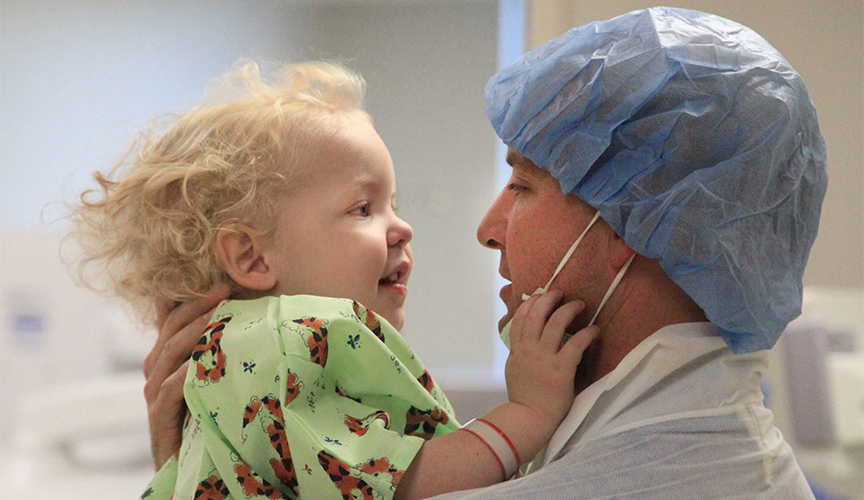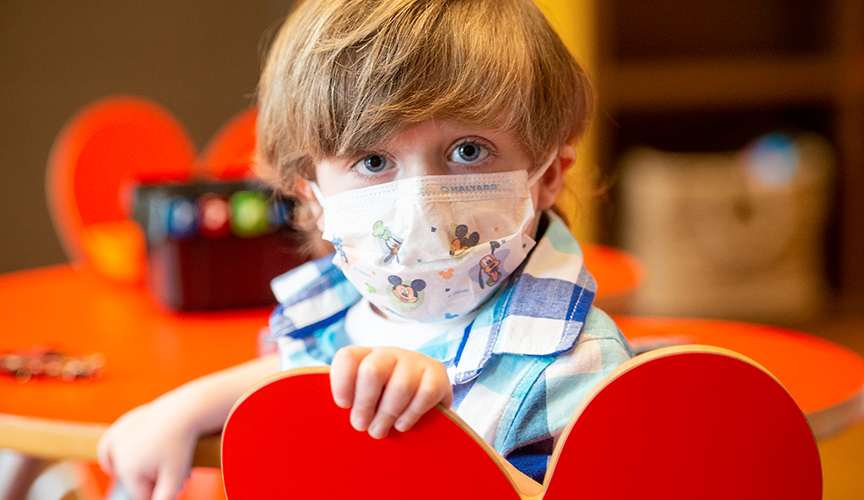Our single ventricle program provides care, support and education for children born with complex congenital heart defects. These congenital heart defects include hypoplastic left heart syndrome (HLHS), tricuspid atresia and pulmonary atresia with intact ventricular septum (PA-IVS).
Why Le Bonheur's Single Ventricle Program?
- For children with hypoplastic left heart syndrome, our surgical survival rates for Stage 1 Norwood repair are greater than 90 percent.
- We offer same-day echocardiogram (ECHO) and electrocardiogram (EKG) testing in our specialized clinic, so your family gets the answers you need as soon as possible. Please keep in mind that visits typically last two to four hours, if testing is needed.
- Our physicians work closely with other pediatric specialists, such as pulmonologists, neurodevelopmental specialists, intensivists and others to provide comprehensive care for each child.
- Our team is part of a national collaborative for improving quality for children with hypoplastic left heart syndrome. Finding new and better ways to treat children is important to us.
For more information about our program, contact us at 901-287-5092. To make an appointment, please call 1-866-870-5570.

Surgical procedures
Single ventricle conditions can require a series of three palliative surgeries during the first few years of life. Surgeries include:
- Newborn: the hybrid procedure, Norwood with modified BT shunt or Sano shunt, or shunt-alone surgeries are typically performed during the first week of life. Babies who undergo a Hybrid procedure as a newborn undergo a Norwood procedure at 3-4 months of age.
- 4-8 months of age: Bidirectional Glenn procedure
- 2-3 years of age: Fontan completion
Surgical Outcomes
The average survival rates for the majority of heart surgeries at Le Bonheur are higher than the national average – especially in the most complex like the Norwood procedure. Compare Le Bonheur's survival rates to the national average by type of procedure:
- Fontan Procedure
- Glenn/HemiFontan
- Norwood Procedure
Support for your child
Reducing risks is important to our team. Between the Norwood/shunt and bidirectional Glenn surgeries, babies are at a higher risk for complications. These complications include poor weight gain, difficulty feeding and shunt thrombosis (clotting). Our team works to reduce these risks through:
- Follow-ups at our Single Ventricle Clinic: Bi-weekly multidisciplinary team visits with pediatric cardiologists, social workers and dietitians to help ensure your baby's health. We also provide echocardiogram (EHCO) and electrocardiogram (EKG) services when needed. Plan to be at the clinic all morning on appointment days. Bring snacks for yourself and your other children, as well as extra diapers, clothes and formula for your baby.
- Home monitoring: A baby scale, pulse oximeter and notebook help you track your baby’s weight, oxygen saturation and milk intake each day. Your nurse or doctor will review this information with you every two weeks at your clinic visit. On weeks without clinic, a nurse will call you to discuss progress and any concerns.
Once your child completes the bidirectional Glenn surgery, home monitoring is discontinued, and regular visits to our Single Ventricle Clinic are less frequent for most patients.

Hypoplastic Left Heart Syndrome
The doctors and nurses on our team participate in the National Pediatric Cardiology Quality Improvement Collaborative, a network of centers with a data registry conducting research to improve outcomes for infants with hypoplastic left heart syndrome (HLHS) in the interstage (between the Norwood and Glenn surgeries). All of Le Bonheur’s HLHS patients from late 2010 to present have been a part of this national registry.
We also partner with Sisters by Heart, a group that provides support to families of children with HLHS.
Resources for Congenital Heart Disease
Meet Our Single Ventricle Program Team
Our specialized single ventricle program team includes three board-certified pediatric cardiologists, a registered nurse, registered dietitian and a social worker.
Dr. Briceno-Medina is a pediatric cardiac intensivist in the Heart Institute at Le Bonheur Children's Hospital. He is certified by the American Board of Pediatrics, and is an assistant professor with the University of Tennessee Health Science Center. Dr. Briceno-Medina completed his Pediatric Cardiology fellowship and advanced specialty training in Cardiac Intensive care at Le Bonheur Children's Hospital.
Dr. Ranjit Philip is an associate professor at the University of Tennessee Health Science Center. Dr. Philip completed his fellowship in Pediatric Cardiology at Le Bonheur Children's Hospital at the University of Tennessee Health Science Center. He has expertise in general pediatric cardiology and non-invasive imaging and serves as director of the Pediatric Cardiology Outpatient Clinic in the Heart Institute at Le Bonheur Children's Hospital. Dr. Philip is also team cardiologist for the University of Memphis.
Dr. Ryan is a specially-trained pediatric cardiologist with advanced training in cardiomyopathy, heart failure and heart transplant care. She completed her fellowship training in Pediatric Cardiology, Pediatric Heart Failure and Heart Transplantation at Le Bonheur Children's Hospital Heart Institute. She is an associate professor at the University of Tennessee Health Science Center and is certified by the American Board of Pediatrics with a cardiology subspecialty.
Single Ventricle Clinic Staff
Kathryn Carpenter, BSN, RN
Teresa Shurley, RD
Meg Harmeier, MSW







